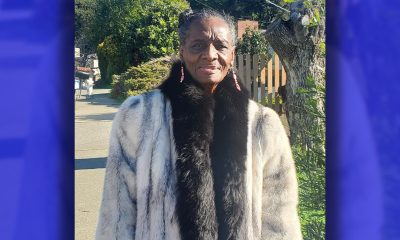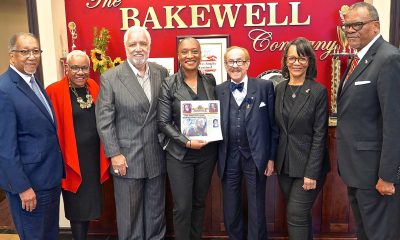Business
Los Angeles Becomes Latest US City to Favor $15 Minimum Wage

Supporters applaud during the minimum wage increase vote as the Los Angeles City Council votes to raise the minimum wage in the city to $15 an hour by 2020, making it the largest city in the nation to do so, in Los Angeles Tuesday, May 19, 2015. (AP Photo/Damian Dovarganes)
ROBERT JABLON, Associated Press
LOS ANGELES (AP) — Los Angeles is the latest and biggest city to endorse a hike in the minimum wage, adding to a string of successes for unions and advocates for the poor who have made it a primary objective as American wages stagnate.
But even those who backed the City Council’s vote for a $15-an-hour wage by 2020 — more than double the current federal minimum requirement — admit it’s an experiment.
There is only patchy data on whether minimum wage bumps hurt or help city economies overall. Seattle and San Francisco only recently passed laws that gradually raise the wage to $15 an hour over several years, while Chicago passed one last year that plateaus at $13.
Still, Los Angeles politicians felt they had to do something to help the throngs of working poor in a city that has some of the highest housing costs in the nation and where nearly 1 in 4 people lives below the poverty line.
The lopsided vote Tuesday of 14-1 ordering drafting of a wage law and the support of Mayor Eric Garcetti virtually guarantee its eventual adoption.
“Today, help is on the way for the 1 million Angelenos who live in poverty,” Garcetti said after the vote.
New York City Mayor Bill de Blasio has said he also wants to boost his city’s lowest hourly pay to $15.
Calls for raising the minimum wage at the national, state and local levels have built as the nation struggles with fallout from the recession, worsening income inequality, persistent poverty and the challenges of immigration and the globe economy.
Average hourly wages in the nation rose just 3 cents in April to $24.87. Wages have risen only 2.2 percent over the past 12 months, roughly the same sluggish pace of the past six years, according to Labor Department figures.
The 9 million jobs lost during the recession have played a role in keeping wages down around the nation and even the recovery has had limited impact.
But the idea of granting people a “living wage” precedes the recession. Baltimore began requiring such a wage for employers with state contracts in 1994. More than 100 cities and counties went on to adopt such laws and in 2007, Maryland adopted the nation’s first statewide bill.
Nationwide, labor unions have been active in calling for increases and in organizing low-paid workers such as hotel cleaners, fast-food clerks and chain-store employees.
An ordinance passed last fall in Los Angeles raised the minimum wage to $15.37 an hour for workers at some hotels starting in July.
Nationwide events last month called on McDonald’s, Burger King, Wendy’s and similar companies to pay workers at least $15 an hour.
The Los Angeles ordinance would raise the minimum wage from $9 to $10.50 in July 2016, followed by annual increases until 2020. Nonprofits and businesses with 25 or fewer employees would have an additional year to reach the $15 plateau.
All of the wage hikes are geared toward helping the working poor, especially in cities such as Los Angeles where the price of survival can be daunting.
Councilman Paul Krekorian said his mother raised a family while waiting tables for minimum wage.
“It would be a whole lot harder to raise a family now doing what she did … because minimum wage has not kept up with the cost of living, with the cost of housing, with the cost of transportation or any of the other costs that we all have to bear,” Krekorian said.
In many states, the push to raise local minimum wages is opposed by state officials concerned that such measures could create a confusing patchwork of pay rates.
The lone dissenting vote in Los Angeles came from Councilman Mitchell Englander, who said he felt raising the minimum wage above that of other Southern California communities might lead businesses to cut working hours and jobs and make it impossible for entire industries to do business.
Some critics question whether raising the minimum wage will actually help the poorest employees.
Among other things, the higher wages may prompt employers to eliminate the least-skilled workers. Also, many minimum-wage workers aren’t poor — many are teenagers who eventually get better jobs — while “most poor families have no workers at all,” argued David Neumark, director of the, Center for Economics & Public Policy at University of California, Irvine, in a Los Angeles Times op-ed piece this month.
Copyright 2015 The Associated Press. All rights reserved. This material may not be published, broadcast, rewritten or redistributed.
Activism
Oakland Post: Week of April 24 – 30, 2024
The printed Weekly Edition of the Oakland Post: Week of April 24 – 30, 2024

To enlarge your view of this issue, use the slider, magnifying glass icon or full page icon in the lower right corner of the browser window. ![]()
Bay Area
State Controller Malia Cohen Keynote Speaker at S.F. Wealth Conference
California State Controller Malia Cohen delivered the keynote speech to over 50 business women at the Black Wealth Brunch held on March 28 at the War Memorial and Performing Arts Center at 301 Van Ness Ave. in San Francisco. The Enterprising Women Networking SF Chapter of the American Business Women’s Association (ABWA) hosted the Green Room event to launch its platform designed to close the racial wealth gap in Black and Brown communities.

By Carla Thomas
California State Controller Malia Cohen delivered the keynote speech to over 50 business women at the Black Wealth Brunch held on March 28 at the War Memorial and Performing Arts Center at 301 Van Ness Ave. in San Francisco.
The Enterprising Women Networking SF Chapter of the American Business Women’s Association (ABWA) hosted the Green Room event to launch its platform designed to close the racial wealth gap in Black and Brown communities.
“Our goal is to educate Black and Brown families in the masses about financial wellness, wealth building, and how to protect and preserve wealth,” said ABWA San Francisco Chapter President LaRonda Smith.
ABWA’s mission is to bring together businesswomen of diverse occupations and provide opportunities for them to help themselves and others grow personally and professionally through leadership, education, networking support, and national recognition.
“This day is about recognizing influential women, hearing from an accomplished woman as our keynote speaker and allowing women to come together as powerful people,” said ABWA SF Chapter Vice President Velma Landers.
More than 60 attendees dined on the culinary delights of Chef Sharon Lee of The Spot catering, which included a full soul food brunch of skewered shrimp, chicken, blackened salmon, and mac and cheese.
Cohen discussed the many economic disparities women and people of color face. From pay equity to financial literacy, Cohen shared not only statistics, but was excited about a new solution in motion which entailed partnering with Californians for Financial Education.
“I want everyone to reach their full potential,” she said. “Just a few weeks ago in Sacramento, I partnered with an organization, Californians for Financial Education.
“We gathered 990 signatures and submitted it to the [California] Secretary of State to get an initiative on the ballot that guarantees personal finance courses for every public school kid in the state of California.
“Every California student deserves an equal opportunity to learn about filing taxes, interest rates, budgets, and understanding the impact of credit scores. The way we begin to do that is to teach it,” Cohen said.
By equipping students with information, Cohen hopes to close the financial wealth gap, and give everyone an opportunity to reach their full financial potential. “They have to first be equipped with the information and education is the key. Then all we need are opportunities to step into spaces and places of power.”
Cohen went on to share that in her own upbringing, she was not guided on financial principles that could jump start her finances. “Communities of color don’t have the same information and I don’t know about you, but I did not grow up listening to my parents discussing their assets, their investments, and diversifying their portfolio. This is the kind of nomenclature and language we are trying to introduce to our future generations so we can pivot from a life of poverty so we can pivot away and never return to poverty.”
Cohen urged audience members to pass the initiative on the November 2024 ballot.
“When we come together as women, uplift women, and support women, we all win. By networking and learning together, we can continue to build generational wealth,” said Landers. “Passing a powerful initiative will ensure the next generation of California students will be empowered to make more informed financial decisions, decisions that will last them a lifetime.”
Business
Black Business Summit Focuses on Equity, Access and Data
The California African American Chamber of Commerce hosted its second annual “State of the California African American Economy Summit,” with the aim of bolstering Black economic influence through education and fellowship. Held Jan. 24 to Jan. 25 at the Westin Los Angeles Airport Hotel, the convention brought together some of the most influential Black business leaders, policy makers and economic thinkers in the state. The discussions focused on a wide range of economic topics pertinent to California’s African American business community, including policy, government contracts, and equity, and more.

By Solomon O. Smith, California Black Media
The California African American Chamber of Commerce hosted its second annual “State of the California African American Economy Summit,” with the aim of bolstering Black economic influence through education and fellowship.
Held Jan. 24 to Jan. 25 at the Westin Los Angeles Airport Hotel, the convention brought together some of the most influential Black business leaders, policy makers and economic thinkers in the state. The discussions focused on a wide range of economic topics pertinent to California’s African American business community, including policy, government contracts, and equity, and more.
Toks Omishakin, Secretary of the California State Transportation Agency (CALSTA) was a guest at the event. He told attendees about his department’s efforts to increase access for Black business owners.
“One thing I’m taking away from this for sure is we’re going to have to do a better job of connecting through your chambers of all these opportunities of billions of dollars that are coming down the pike. I’m honestly disappointed that people don’t know, so we’ll do better,” said Omishakin.
Lueathel Seawood, the president of the African American Chamber of Commerce of San Joaquin County, expressed frustration with obtaining federal contracts for small businesses, and completing the process. She observed that once a small business was certified as DBE, a Disadvantaged Business Enterprises, there was little help getting to the next step.
Omishakin admitted there is more work to be done to help them complete the process and include them in upcoming projects. However, the high-speed rail system expansion by the California High-Speed Rail Authority has set a goal of 30% participation from small businesses — only 10 percent is set aside for DBE.
The importance of Diversity, Equity and Inclusion (DEI) in economics was reinforced during the “State of the California Economy” talk led by author and economist Julianne Malveaux, and Anthony Asadullah Samad, Executive Director of the Mervyn Dymally African American Political and Economic Institute (MDAAPEI) at California State University, Dominguez Hills.
Assaults on DEI disproportionately affect women of color and Black women, according to Malveaux. When asked what role the loss of DEI might serve in economics, she suggested a more sinister purpose.
“The genesis of all this is anti-blackness. So, your question about how this fits into the economy is economic exclusion, that essentially has been promoted as public policy,” said Malveaux.
The most anticipated speaker at the event was Janice Bryant Howroyd known affectionately to her peers as “JBH.” She is one of the first Black women to run and own a multi-billion-dollar company. Her company ActOne Group, is one of the largest, and most recognized, hiring, staffing and human resources firms in the world. She is the author of “Acting Up” and has a profile on Forbes.
Chairman of the board of directors of the California African American Chamber of Commerce, Timothy Alan Simon, a lawyer and the first Black Appointments Secretary in the Office of the Governor of California, moderated. They discussed the state of Black entrepreneurship in the country and Howroyd gave advice to other business owners.
“We look to inspire and educate,” said Howroyd. “Inspiration is great but when I’ve got people’s attention, I want to teach them something.”
-

 Activism4 weeks ago
Activism4 weeks agoOakland Post: Week of March 27 – April 2, 2024
-

 #NNPA BlackPress4 weeks ago
#NNPA BlackPress4 weeks agoBeloved Actor and Activist Louis Cameron Gossett Jr. Dies at 87
-

 Community1 week ago
Community1 week agoFinancial Assistance Bill for Descendants of Enslaved Persons to Help Them Purchase, Own, or Maintain a Home
-

 Activism3 weeks ago
Activism3 weeks agoOakland Post: Week of April 3 – 6, 2024
-

 Business2 weeks ago
Business2 weeks agoV.P. Kamala Harris: Americans With Criminal Records Will Soon Be Eligible for SBA Loans
-

 Activism2 weeks ago
Activism2 weeks agoOakland Post: Week of April 10 – 16, 2024
-

 Community2 weeks ago
Community2 weeks agoAG Bonta Says Oakland School Leaders Should Comply with State Laws to Avoid ‘Disparate Harm’ When Closing or Merging Schools
-

 Community1 week ago
Community1 week agoOakland WNBA Player to be Inducted Into Hall of Fame























































